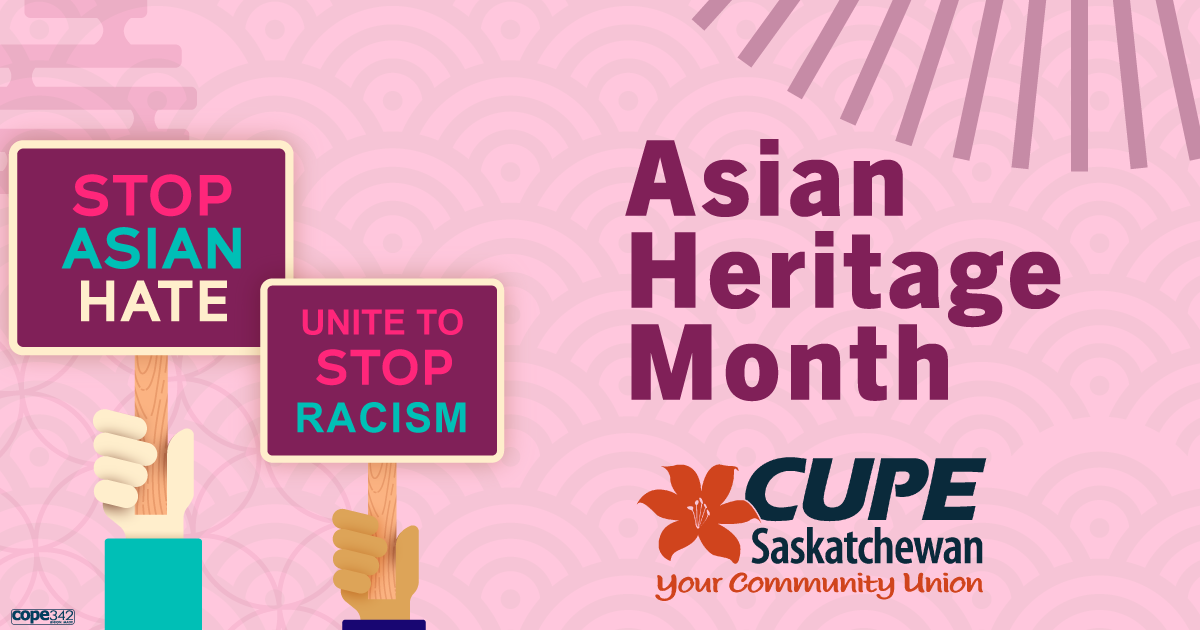 May is Asian Heritage Month, dedicated to recognizing and celebrating the diversity of our communities and within our union of our sisters, brothers, and friends whose origins are connected to the many vibrant cultures of East Asia, Southern Asia, Central Asia, Western and Southeast Asia. It is also a time to recommit as fellow union members to the important role of speaking up against racism in our workplaces, online, and in our home communities.
May is Asian Heritage Month, dedicated to recognizing and celebrating the diversity of our communities and within our union of our sisters, brothers, and friends whose origins are connected to the many vibrant cultures of East Asia, Southern Asia, Central Asia, Western and Southeast Asia. It is also a time to recommit as fellow union members to the important role of speaking up against racism in our workplaces, online, and in our home communities.
During the COVID-19 pandemic, there has been a disturbing rise of anti-Asian racist incidents across Canada and throughout the rest of the world. On March 16th of this year, a mass shooting in Atlanta, Georgia, USA, targeted Asian American women working in spas, resulting in six deaths. In Canada, the Chinese Canadian National Council tallied over 1,000 occurrences of racism and discrimination targeted against Asian Canadians since the start of the pandemic (from March 2020 to December 31, 2020.) The report found that the young, elderly, and those with lower-income jobs more vulnerable to attacks – with most incidents occurring in public spaces such as parks, streets, or sidewalks. We must all stand united to stop Asian hate in our communities, our workplaces, and online. We all must take action to challenge racism when we witness it. We must stand up against the stigma of the COVID-19 virus and misinformation.
- Watch the video from the Chinese Canadian National Council for Social Justice: Stop the Spread of Racism.
- Raise awareness in yourself and others. Learn about the 5 Ds for Bystander Intervention.
During the month of May, we reflect on the historic fight for human rights and social justice of Asian communities in Canada who have faced hostile and discriminatory immigration policies, most notably through the Chinese Head Tax, the Chinese Exclusion Act in 1923, and the discrimination reflected by the Komagata Maru incident in 1914 – a ship carrying would-be arrivals mostly from Punjab, India that was refused docking and entry. The denial of full citizenship and the right to vote of most Canadians of Asian origin until 1949, Japanese internment during the second world war, and the many deaths of workers in the building of the Canadian Pacific Railway of Chinese heritage are but some of the many historical harms domestically in Canada.
We also recognize the historic activism and resilience of the Asian community. In Saskatchewan, a Regina resident and restaurant owner, Clun Yee, challenged a law in 1924 that required a licence because of Yee’s race to hire women workers. Saskatchewan later became the first province in Canada under the CCF government (now known as the NDP) led by Tommy Douglas that introduced the first general law prohibiting discrimination based on race with The Saskatchewan Bill of Rights in 1947. These historical struggles and injustices are a reminder of the hurt and pain caused by racial discrimination.
Learn more about these historical events from the following sources:
- Yee, Clunn (The Encyclopedia of Saskatchewan).
- Events in Asian Canadian history (Published on the Government of Canada website).
- The Saskatchewan Bill of Rights in 1947 (Refer to the December 2017 article, 70th Anniversary of the Saskatchewan Bill of Rights Act, published by The Saskatchewan Human Rights Commission, to learn more about human rights in Saskatchewan).
Though celebrated since the 1990s, Asian Heritage Month was official declared by the Government of Canada in May 2002 following the adoption of a motion introduced in December 2001 by Senator Vivienne Poy, an accomplished Canadian of Asian heritage and first Canadian senator of Asian ancestry.
During May and throughout the year, let’s continue to celebrate our collective diversity and support one another to build workplaces and communities that are fair, equal, and inclusive for everyone.
Published by the Division Office / n.m. Cope 342
